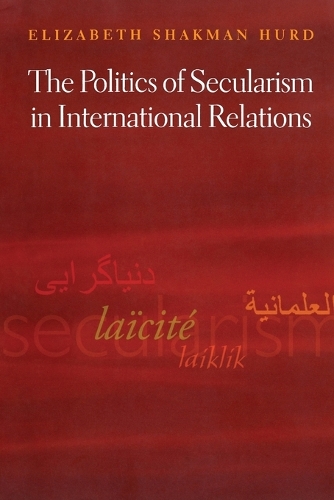
The Politics of Secularism in International Relations
(Paperback)
Publishing Details
The Politics of Secularism in International Relations
By (Author) Elizabeth Shakman Hurd
Princeton University Press
Princeton University Press
7th January 2008
United States
Classifications
Professional and Scholarly
Non Fiction
327.101
Physical Properties
Paperback
264
Width 152mm, Height 235mm
369g
Description
Conflicts involving religion have returned to the forefront of international relations. And yet political scientists and policymakers have continued to assume that religion has long been privatized in the West. This secularist assumption ignores the contestation surrounding the category of the "secular" in international politics. The Politics of Secularism in International Relations shows why this thinking is flawed, and provides a powerful alternative. Elizabeth Shakman Hurd argues that secularist divisions between religion and politics are not fixed, as commonly assumed, but socially and historically constructed. Examining the philosophical and historical legacy of the secularist traditions that shape European and American approaches to global politics, she shows why this matters for contemporary international relations, and in particular for two critical relationships: the United States and Iran, and the European Union and Turkey. The Politics of Secularism in International Relations develops a new approach to religion and international relations that challenges realist, liberal, and constructivist assumptions that religion has been excluded from politics in the West.The first book to consider secularism as a form of political authority in its own right, it describes two forms of secularism and their far-reaching global consequences.
Reviews
Co-Winner of the 2011 Hubert Morken Award for the Best Publication in Religion and Politics, Religion and Politics Section of the American Political Science Association "This book is a timely and sobering discussion of important theoretical, as well as practical, issues of IR theorizing and how religion relates to politics in general. It is a first-rate read and can be recommended to all scholars interested in the interplay of religion and politics."--Ragnhild Nords, Journal of Peace Research "Hurd has produced a timely and compelling book that will be of interest to a wide range of scholars well beyond the discipline of international relations theory."--Dianne Kirby, H-Net Reviews "Hurd's study deserves praise for its original slant on the role of secularism in international relations. Its rich and well-written discussion in both case studies will also attract academics in related areas."--Hakki Tas, Political Studies Review "[T]his is a useful and provocative work that should be read carefully. Its analysis should be applied to other contexts, because without an adequate understanding of religion--or even of our own misconceptions about religion--we will continue to mismanage our relations with states and communities shaped in part by faith identities."--John Anderson, International Affairs "There is much to like about this exhaustively researched book. Its innovative argument calls on those who study the relationship of religion to international relations to rethink how they view their subject at the most fundamental level. I would recommend it to anyone doing research in this field, especially those working on the responses of the West to political Islam."--Patrick Callahan, Journal of Politics and Religion "Elizabeth Hurd presents a valuable analysis that ... contains a wide bibliography, makes use of interdisciplinary theoretical insights, and illuminates contemporary political events."--Ali Yasar Sanbay, Turkish Journal of Islamic Studies
Author Bio
Elizabeth Shakman Hurd is assistant professor of political science at Northwestern University.
